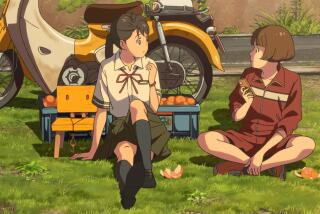Creature Comfort : Ailing Girl’s Wish Comes True With Oxnard Teen, His Bugs
- Share via
OXNARD — It was an international meeting of two young entomologists who do not share a common language.
He, a 14-year-old from Oxnard with a world-class insect collection.
She, a terminally ill 8-year-old from Tokyo with one final wish--to see and play with the boy’s collection of rare bugs.
In a plain south Oxnard home Sunday morning, the two young scientists didn’t need words to share their love for insects.
Takae Tsuchida sat on a couch, propped up by two pillows. The girl was tired after the long flight from Japan just two days earlier and debilitated by a malignant brain tumor that her doctor says will soon take her life.
James Fujita, the Oxnard teen, kindly handed her a giant African millipede. As the shiny 10-inch crawler arched its head, its numerous limbs grasping for something to hold on to, Takae cracked a faint smile.
“It feels really good,” James said. “It’s really neat to see her happy.”
But for Takae, the highlight of the trip was catching sight of James’ rhinoceros beetles, now developing inside a cocoon--the first ones that have successfully hatched in the United States.
Takae traveled from Japan with her parents and doctor through the auspices of the Make-A-Wish Foundation, an international group that grants wishes to children with life-threatening illnesses. She has been fascinated by insects since she was 2.
She first became passionate about the giant rhinoceros beetles while preparing a yearlong school project in Japan. Takae had raised some small specimens, but called natural history museums around the world in hopes of finding some of the larger insects. The males are up to 6 inches in length and the females slightly smaller. James Fujita’s name kept coming up.
In 1994, James brought three pairs of the giant beetles from Costa Rica. Before he donated them to the Los Angeles County Museum of Natural History, the beetles mated, and James set off to raise the eggs. They hatched into grubs, a kind of larvae, and grew into the pupa stage, still inside a cocoon.
The original beetles, which usually live no longer than a year, have since died. But their offspring are expected to turn into full-blown beetles in the next couple of months, the first hatched in the United States to have developed this far, said David Fujita, James’ father. Previous attempts to hatch the critters at the Cincinnati Zoo and the Los Angeles County Museum of Natural History have failed, he said.
Despite his age, James is quite an authority on bugs. He began collecting butterflies when he was 3. Since then, he has amassed a formidable array of exotic insects. He lectures on entomology throughout Ventura County schools and colleges, and has helped identify and catalog insects at several Nature Conservancy preserves.
James even appeared on television in 1994 as a guest of “The Tonight Show With Jay Leno,” where he showcased a variety of insects.
Moved by the same passion, Takae became determined to meet James. He became a role model for her, David Fujita said.
On Saturday, the two had their first indirect contact. James sent two Malaysian walking sticks--elongated insects that remain motionless and simulate grass stems and twigs--to Takae’s hotel room.
After playing with them, the girl was energized and able to walk unsupported for the first time in at least a month, her father, Mitsuo Tsuchida, said through an interpreter.
Takae took frequent breaks from the excitement aroused by the exotic bugs. And while the tumor has already taken away her ability to see out of one eye, she showed obvious delight when James presented her with walking sticks, giant silk worms and more millipedes. She laughed and squealed with delight.
“Her mother told me that’s the first time she looked happy in three months,” David Fujita said.
And Takae will even get to take a preserved rhinoceros beetle home. The special gift from James comes at the right time--Takae turned 8 Thursday.
More to Read
Sign up for Essential California
The most important California stories and recommendations in your inbox every morning.
You may occasionally receive promotional content from the Los Angeles Times.













